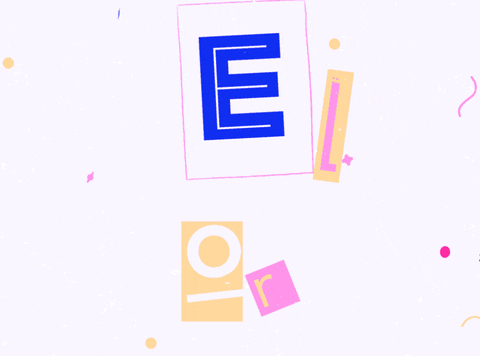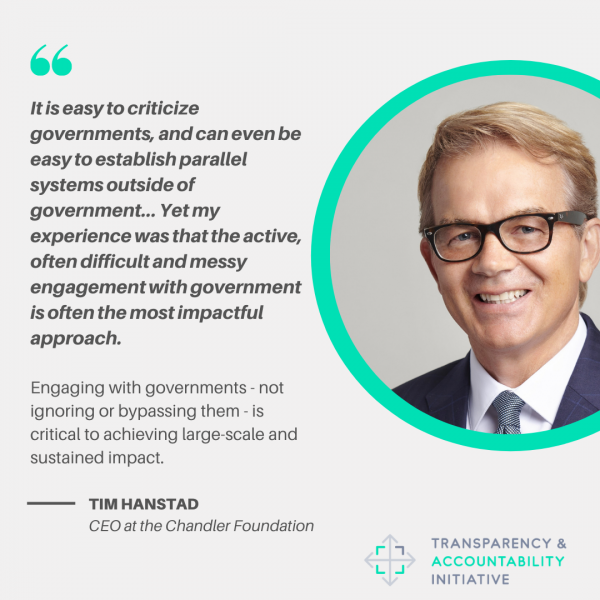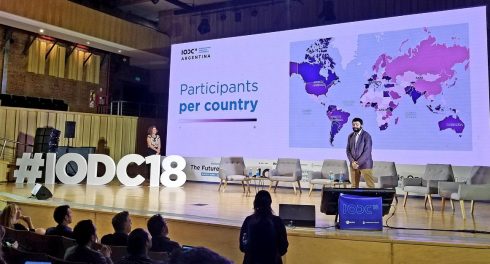Highlight
- On the hook
- Locally owned (open gov style)
- COVID contradictions
- Numbers game
- Inspire me
- Full Disclosure – the People behind TPA
- TAI Spotlight: Funder voices & responses to the pandemic
On the hook

Photo via Elevate Workforce
This past week was Global Accountability Week— a chance to raise awareness on civil society’s efforts to be accountable towards their communities and each other. Hence, a good time to reflect on how to scale inclusive social accountability and read Accountability Now’s CSO Accountability in Focus report, which focused on four key areas civil society sector, is advancing stakeholder engagement.
There is also the very practical struggle to keep accountability activities going when the funding tap turns off. Derek Thorne shares what Integrity Action is currently doing to ensure sustainability in social accountability.
Exciting to see accountable governance is one of four themes for the newly launched World Justice Challenge 2021 – don’t be shy of sharing your ideas for furthering the rule of law in the current context.

Essential Participation: Add your voice to Integrity Action’s Brainstorming survey
Integrity Action has published a briefing note and launched a brainstorming survey to look into some key questions about how citizen-centered accountability mechanisms can be funded, governed, and administered in the long term. You will have the option to remain anonymous when responding to the survey which has 11 questions and take around 15 minutes to complete. Find the home page for this research here.
Locally owned (open gov style)
What do Tirana, Kandahar, and Quito have in common? They all just joined the Open Government Partnership (OGP) along with 53 other local jurisdictions. An exciting move and it will be interesting to assess how these municipal leaders provide ongoing leadership, especially as new research from Luciana Cingolani suggests government-led open government initiatives survive longer than citizen-led ones. Luciani points to platforms like OGP helping catalyze such efforts but not significantly influencing their survival.
We look forward to comparing with findings from the ongoing evaluation of the OGP process (stay tuned for thematic learning sessions on early findings).
Perhaps new local government commitments to transparency can help arrest declining levels of trust in social, economic, and political institutions. Of course, it would help if political leaders and elected officials can find ways to stop being spreaders of disinformation and if societies can find ways to shore up public interest journalism that has been gravely impacted by the pandemic.
Building on last week’s feature on the need for surveillance transparency, Sanjana Varghese discusses the myriad of biometric technologies that circumvent face recognition bans to make our bodies legible to surveillance systems. Meanwhile, Trust Law and openDemocracy are working together to explore possible legal bases for data transparency.
COVID contradictions
The pandemic is revealing some inconsistencies in societal responses that look hard to sustain. For example, Investigate Europe reveals the European Union is planning to invest at least €104bn in fossil fuel infrastructure in coming years despite its ambitious target to go green. Juliet Ferguson says such investments risk gas lock-in or ending up as stranded assets, while Helen Clark lays out four ways the Extractive Industries Transparency Initiative can contribute to the energy transition.
TAI is excited to be part of post-pandemic scenarios to strategy sessions organized by the Publish What You Pay network this week, which are further revealing the interconnections between issues. The thrust aligns with Marie-Stéphane Maradeix urging foundations to stop “thinking of sectors like environment, education, or health as completely separate from climate change; instead, we have to see climate as a cross-cutting issue.” Active Philanthropy has published a new guide on how foundations can incorporate climate change into their funding strategies.
Sticking with the inter-relation theme, the Economist urges governments to cut out some $35bn in subsidies and clamp down on forced labor in the fishing sector to help poor coastal states recover some $20bn in revenues lost each year to illegal fishing.
Returning to pandemic impacts, Oxfam and ONE are urging the World Bank to practice what it preaches on debt. Although the Bank publicly pushed bilateral and private creditors to take stronger action to provide debt relief, the institution itself failed to suspend debt service payments.
Nevertheless, Nisha Dhawan argues that the pandemic is/should be helping organizations pay attention to fixing imbalances and inequalities of gender and power, including who holds knowledge, who has a seat at the table, and how decisions are made. Certainly, gender mainstreaming becomes all the more important.
Numbers game

20 cents or 37 euros? There is incredible variance in what governments are paying for basics of PPE, but also for tests, ventilators, treatments. OCCRP and 37 partners break down the €20.8billion in Europe’s COVID-19 procurement.
Casey Wetherbee says corruption in many Latin American countries has infiltrated the healthcare industry and fighting corruption must be front and center in the region’s health and economic recovery response. Tony Barber worries that a failure to insist on rule of law in Europe’s pandemic relief packages means that corruption will become a bigger problem in EU going forward.
New research in the form of two new reports from Transparency International is hardly encouraging. They estimate nearly half of world exports come from countries that fail to punish foreign bribery while the Accountable Mining team lay out ways that EITI can be used to limit mining corruption risks.
How much to rely on global platforms? Odd-Helge Fjeldstad and Gael Raballand argues that strong political will, local buy in, and improved awareness as seen in Georgia and Rwanda’s anti-corruption reforms are ultimately effective than transposing norms and approaches from OECD countries. This support the World Bank Global Report on Anti-Corruption stance that “addressing the root causes of corruption goes beyond legal reforms, code of ethics or IT system upgrades.”
In terms of inspiring change, Accountability Lab DRC has launched a youth-centered anti-corruption program in partnership with Anti-Corruption Research Center Congo and Cercle d’Echange pour le Developpement des Jeunes, while CoST Ukraine has launched the “Great Construction Transparency” project to promote transparency around government’s flagship infrastructure programme. Good also to see another open contracting commitment in Kenya as the government of Nyandarua County signed an MOU with Development Gateway to create an Open Contracting Portal similar to the one launched in Makueni County.
Returning to the world of cross-border dealings, following the cracks exposed by the FINCEN files, the International Consortium of Investigative Journalists spoke with finance, legal and offshore experts to pinpoint six ways to reform the global financial system.
Of course, it all comes down to incentives and disincentives. So, intriguing to learn that the US government has paid out $114m to one whistleblower alerting them to corporate malfeasance. That may encourage more to come forward. At the same Goldman Sachs agreed to pay nearly $3bn to end a probe of its role in the Malaysia’s 1MDB bribery scheme. $3bn sounds a lot, but is it sufficient deterrent at a time, when as Felix Salmon argues, we are overdue a crack down on white-collar crime?
Inspire me

If you are a regular Weekly reader, you will know that we are fans of the power of story. So, glad to see BMW Foundation pull together stories from the past 3 years of funding for a more just and sustainable future. Read with the inspiring story of how dozens of communities in Mozambique are mapping and documenting their own land rights – winner of the Land Portal’s latest data story competition.
Stories can inform reflection and inspire shifts in approach, but Kevin Staff and Sarah Miers wonder why big international NGOs too often fail to replicate proven solutions from social entrepreneurs that could make a big dent in a lot of big problems. Duncan Green advise NGOs against these common mistakes when strategizing while Margaret Dunham share lessons on how nonprofits can build resiliency from a recent webinar organized by Taproot Foundation.
The now-concluded Global Learning for Adaptive Management initiative has produced a searchable library of monitoring, evaluation, and learning resources and abstracts. Explore alongside the World Bank’s Independent Evaluation Group interactive map which shows the more than 350 project evaluations and validations for FY20.
You may also want to check out this open-source tech guide for non-profits and tips from Alberto Cairo on ensuring your visualizations are ethically sound.
We leave you with views from African researchers on whether randomized control trials are useful when studying development and governance-related topics (spoiler alert – not much!)
Full Disclosure – the People behind TPA: Tim Hanstad on Impactful Approach to Transparency

We continue to shed more light on individual and collective work of Transparency, Civic Participation, and Accountability (TPA) actors. This week, Chandler Foundation CEO, Tim Hanstad shares his motivation and the closest thing to real magic he has experienced in the transparency, accountability and civic participation field.
TAI Spotlight: Funder voices & responses to the pandemic
Funder voices & responses to the pandemic | Transparency and Accountability Initiative
Issue 2 of our COVID-19 Monitor digs into 98 sources detailing public actions or commitments global funders have made around how they provide financial and non-financial support amid the current crisis. See what these responses add up to.
Moving beyond words: Commitments that make a difference | MacArthur Foundation
Discover how MacArthur Fellow and CEO and co-founder of Mobility International USA, Susan Sygall, helped the Foundation’s 100&Change applicants projects make sure they included people with disabilities at all levels.
Refreshing our strategy to combat digital disinformation | Hewlett Foundation
Two years after launching a grantmaking strategy to combat digital disinformation, the Foundation’s U.S. Democracy Program shares success of the strategy and next steps.
Soros Economic Development Fund invests in race and gender equity | Open Society Foundations
The Foundations’ impact investing arm joins anchor investors in an Illumen Capital fund which seeks to end entrenched racial and gender biases that exclude Black and women-owned business from access to capital.
Future-proofing media freedom | Luminate
What solutions exist to ensure the survival of independent media organizations? Listen to the first episode of the new mini-series on the Undercurrents podcast feed produced by Luminate in collaboration with Chatham House and the International Center for Journalists.
Job Listing
- Assistant Editor in Chief for Investigations at OCCRP (Based in Sarajevo) – November 15, 2020
- Government Affairs Senior Policy Advisor, International Financial Institutions at Oxfam – Ongoing
- Data Architect at Open Data Institute – Ongoing
- Luminate Director, Africa – Ongoing
- Job postings at Hewlett Foundation – Ongoing
- Job postings at MacArthur Foundation – Ongoing
- Job postings at Open Society Foundations – Ongoing
- Job postings at Luminate – Ongoing
Job postings at Ford Foundation – Ongoing
Call/ Opportunities
- Proposal Opportunity: Explore sharing of mobility data during the pandemic – October 26, 2020
- World Justice Challenge 2021 – December 11, 2020
- Governance and the COVID-19 Pandemic in the Global South, EGAP – December 15, 2020 Deadline
- Call for submissions to SSIR Series: Social change in an era of extreme polarization – Last Thursday of every month until early 2021
- USAID’s Development Innovation Ventures (DIV) grant funding – Ongoing
- BetterTogether Challenge for innovators – Ongoing
- Call for research proposals Tax and civil society – No Deadline
- Free Digital Security Training – Ongoing
- Open Road Alliance Charitable Grant and Loan to organizations responding directly to COVID-19 – Ongoing
- Pulitzer Center Coronavirus news collaboration challenge – Applications will be reviewed on a first-come, rolling basis
- Call for proposals: Informality, tax, and the state – Proposals accepted on a rolling basis
Calendar
- Tax for Development Webinar Series – October 20-December 15, 2020 3 November; 17 November; 1 December; 15 December, 2020 (15:00 – 16:00 CET)
- Watching the Watchers: Investigative Journalism in the Digital Age – October 28, 2020 (9:00 am—10:00 am EST)
- Tackling Extractive Sector Corruption in Unstable Times – October 28, 2020 (Online)
- OpenGov Digital Youth Summit – October 27–28, 2020 (Online)
- Humanitarian and Development Data Forum – November 2-4, 2020 (Chambery, France)
- Open Data Institute Summit – November 10, 2020 (online)
- International Civil Society Center – Global Perspectives Experience – November 2-5, 2020 (12 pm-12am, Online)
- Digital Freedom Fund Virtual Litigation Retreat – November 12-18, 2020 (excluding weekend)
- World Forum for Democracy (democracy and the environment) – November 16-18, 2020
(Strasbourg, France) - Transparency International: 19th International Anti-Corruption Conference – December 1-4, 2020 (online)
- International Open Data Conference – (Postponed till 2021)


